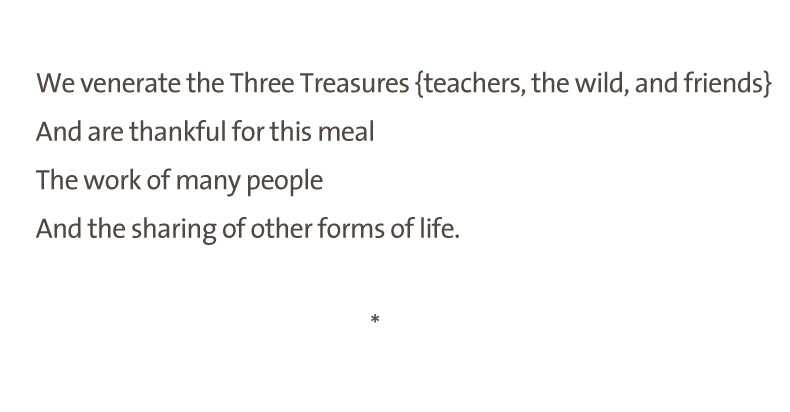We’ve come upon this passage about saying grace before a meal many times while flipping through The Gary Snyder Reader: Prose, Poetry, and Translations and each time have thought, We need to do that, to at least think it if not say it aloud. Snyder’s view is just right. It may be especially resonant now that we are receiving food every week from Essex Farm in northern New York. We are cooking and eating with the seasons and are astounded weekly by that abundance that we are lucky to have. In hearing of what goes on on the farm, we feel like we somehow are part of it, aware of the weekly harvesting of vegetables, gathering of eggs, careful, mindful slaughtering of animals.
In The Practice of the Wild, Snyder puts eating in a much bigger context that we find deeply connecting and comforting. His grace is about taking a moment to think about our food and to express gratitude for the hugely creative force behind it, which we are part of:
Eating is a sacrament. The grace we say clears our hearts and guides the children and welcomes the guest, all at the same time. We look at eggs, apples, and stew. They are evidence of plenitude, excess, a great reproductive exuberance. Millions of grains of grass-seed that will become rice or flour, millions of codfish fry that will never, and must never, grow to maturity. Innumerable little seeds are sacrifices to the food-chain. A parsnip in the ground is a marvel of living chemistry, making sugars and flavors from earth, air, water. And if we do eat meat it is the life, the bounce, the swish, of a great alert being with keen ears and lovely eyes, with foursquare feet and a huge beating heart that we eat, let us not deceive ourselves.
We too will be offerings—we are all edible. And if we are not devoured quickly, we are big enough (like the old down trees) to provide a long slow meal to the smaller critters. Whale carcasses that sink several miles deep in the ocean feed organisms in the dark for fifteen years. (It seems to take about two thousand to exhaust the nutrients in a high civilization.)
At our house we say a Buddhist grace—
We venerate the Three Treasures {teachers, the wild, and friends}
And are thankful for this meal
The work of many people
And the sharing of other forms of life.Anyone can use a grace from their own tradition (and really give it meaning)—or make up their own. Saying some sort of grace is never inappropriate, and speeches and announcements can be tacked onto it. It is a plain ordinary, old-fashioned little thing to do that connects us with all our ancestors.

You can read the entire Practice of the Wild here. This excerpt is on page 185.




